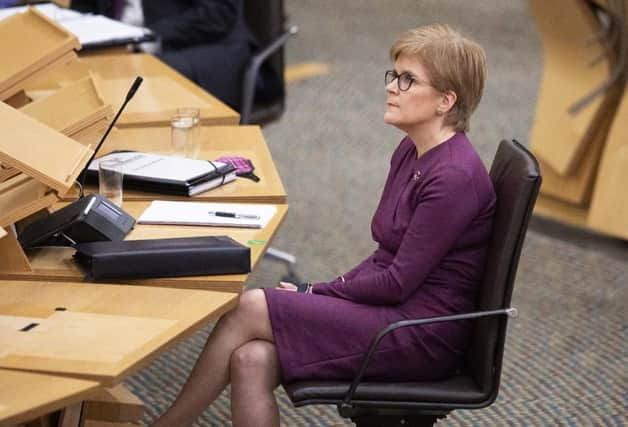Analysis: Lack of true transparency could come back to haunt Nicola Sturgeon


Often used to justify the ongoing broadcast of the First Minister’s briefings on the BBC, Nicola Sturgeon has leaned on ‘transparency’ to shore up support for policies.
The First Minister’s favourite line is that she is on television every day to explain, as much as she can to the public, what the evidence is for the policies she is introducing.
To an extent, that is worth applauding.
Advertisement
Hide AdAdvertisement
Hide AdThe briefings offer a daily opportunity to question the leader of Scotland’s government on her handling of the biggest crisis since the war, and yet the result feels underwhelming.
The issue is that while there are claims of transparency, the truth is far removed from the proffered reality.
To illustrate the point, the Scottish Government has refused to release legal advice relating to the Salmond Inquiry – a matter of such huge public interest that any suggestion the law favours non-disclosure is laughable even if it is historically rarely released.
Ms Sturgeon has also refused to be drawn on the number of people discharged into care homes with a positive Covid-19 test.
And the Scottish Government refused to release the forecasting analysis it undertook to predict the potential number of deaths linked to a potential second wave.
And, to bring it back to the briefing, the failure of the First Minister to openly announce the botched reporting of contact tracing figures.
All of those cases have come in the past fortnight alone.
That list can be continued. In November the Scottish Government refused to release correspondence it had with universities and in October was accused of being involved with a cover-up with the SQA around the exam results debacle after no minutes, agendas or briefings were taken or shared in all but one meeting involving John Swinney.
In addition to all of the above, it should not be forgotten that Ms Sturgeon’s colleague Jeane Freeman called for the end of Freedom of Information rules during the pandemic.
Advertisement
Hide AdAdvertisement
Hide AdEventually overruled, the legislation was still changed to allow for 60 days to respond rather than the statutory 20, neutering the Act for the first few months of the pandemic.
It is, however, the Salmond inquiry that poses the biggest potential problem for Ms Sturgeon.
While for many casual politics observers, the intense attention on the inquiry and subsequent stories can be overwhelming to the point where it all blends into one, the potential for that inquiry to do very real and very permanent damage to the First Minister is clear.
It is not an uncommon view among the members of the Salmond inquiry that they believe the Scottish Government and the First Minister is attempting to hide something damaging.
The fact that legal advice has not been published fuels that theory.
SNP supporters who prefer to think their leaders are capable of no wrong will dismiss it as conspiracy to subvert their party, but the lack of transparency and critically the lack of helpful transparency to the inquiry, is telling.
This is a government with an aversion to transparency, not one that openly embraces it.
Fundamentally, it suggests the government and its leader has something to hide.
That distrust could come back to haunt the First Minister.
A message from the Editor:
Thank you for reading this article. We're more reliant on your support than ever as the shift in consumer habits brought about by coronavirus impacts our advertisers.
If you haven't already, please consider supporting our trusted, fact-checked journalism by taking out a digital subscription.
Comments
Want to join the conversation? Please or to comment on this article.
